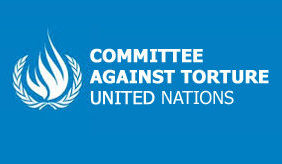12 May 2017 – The United Nations (UN) Committee Against Torture (CAT) released its concluding observations regarding Bahrain’s second and third periodic reports today as the panel’s 60th session comes to a close in Geneva. This session marked the first time in five years that the CAT has conducted a review of Bahrain’s record of compliance with its international human rights obligations relating to the prevention of torture. Americans for Democracy & Human Rights in Bahrain (ADHRB) welcomes the Committee’s wide-ranging concerns and recommendations regarding the systematic use of torture and the environment of impunity in Bahrain, and calls upon the Government of Bahrain to promptly accept and adhere to the CAT’s guidance.
The CAT’s concerns and recommendations begin by making note of the chasm that often exists between Bahrain’s legislative and institutional framework, and its practical implementation thereof. The Government of Bahrain has, for example, adopted a legal definition of torture that conforms to international standards and has established a number of mechanisms that are ostensibly aimed at ensuring accountability for abuses such as torture. Nonetheless, as the Committee notes, reports of Bahraini authorities subjecting individuals in their custody to torture and ill-treatment remain numerous, widespread, and consistent. Furthermore, the CAT raises concern over the lack of independence of the government’s accountability mechanisms, the low number of torture convictions in the country, and the government’s failure to hand down punishments commensurate with the gravity of such crimes. Moreover, the CAT focuses on Bahraini authorities’ continued use of torture to coerce confessions and the acceptance of such confessions as evidence throughout judicial proceedings. A number of recommendations call on the government to amend the country’s legal code in order to bar evidence obtained under duress and to ensure that all allegations of torture are promptly and independently investigated.
The Committee also shared its concern over a number of troubling recent developments in Bahrain, including the resumed application of the death penalty in January 2017, the restoration of law enforcement and arrest powers to the National Security Agency (NSA), and the April 2017 approval of a constitutional amendment allowing civilians to be tried in military courts in national security cases. With regard to the issue of the death penalty in particular, the CAT notes that the trials of the three men executed in January had been based on confessions obtained under torture. So, too, have the trials of men currently on death row in the country. As such, the CAT calls on the Government of Bahrain to consider re-instating a moratorium on the penalty’s application and to move towards holding new trials in the cases of individuals whose death sentences are based on coerced confessions.
The CAT also addressed the numerous allegations of acts of reprisal and intimidation directed at human rights defenders, journalists, and their relatives as a result of their work. In particular, the Committee notes its deep concern at reports of the torture and ill-treatment of and deprivation of adequate medical care to Nabeel Rajab, Abdulhadi al-Khawaja, Abduljalil al-Singace, and others. The CAT elaborates on Nabeel Rajab’s case, noting with concern that Bahraini authorities have reportedly held Rajab in solitary confinement for more than nine months while denying him access to appropriate medical care. The Committee called on the Government of Bahrain to release Rajab, as well as all other imprisoned human rights defenders and journalists, and to ensure that all related allegations of torture are subject to prompt and independent investigations.
In addition to those mentioned above, the Committee also raised concerns relating to laws that inadequately criminalize violence against women, the detention and torture of minors, lengthy pre-trial detention periods, the failure to provide all fundamental legal safeguards to individuals deprived of their liberty, and the government’s refusal to engage with UN Special Procedures mandate holders, including the Special Rapporteur on torture.
“The CAT’s thorough and forceful conclusions highlighting the extent of the Bahraini government’s torture and ill-treatment of prisoners are a welcome development, but they must be followed up with action,” said Husain Abdulla, Executive Director of ADHRB. “Moving forward, it is incumbent upon the international community as a whole to ensure that Bahrain is not allowed to simply resume business-as-usual. A good start would be actively encouraging the Government of Bahrain to allow access to the Special Rapporteur on torture and a reporting team from the Office of the High Commissioner for Human Rights.”
The conclusions of the Committee against Torture come on the heels of the 34th session of the Human Rights Council (HRC) as well as Bahrain’s 3rd cycle Universal Periodic Review (UPR). In both instances, the broader deteriorating human rights situation in Bahrain, including torture, were highlighted by states and independent organizations from around the world. At the UPR, for example, UN member states provided Bahrain with more than 215 separate recommendations regarding ways in which to improve the human rights situation in the country. This represents an important opportunity for the international community to seize on the momentum provided by these forums in order to push the Government of Bahrain to enact meaningful reforms. ADHRB therefore calls on all states, particularly those who raised their voices during the HRC, the UPR and the CAT review, to ensure that Bahrain does not allow their concerns to go ignored.





